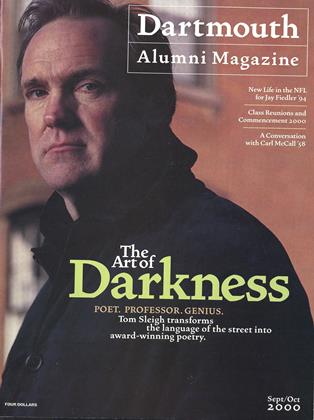In the wired world of higher education, Dartmouth offers something more.
THAT GREAT SAGE YOGI Berra once said, "The future ain't what it used to be." As I contemplate the issues surrounding technology and the academy, this line seems particularly apt.
Technology is transforming our world of higher education at a dizzying pace. Moore's Law, articulated by Gordon Moore, the cofounder of Intel, holds that the data-storage capacity of new computer chips doubles every 18 months. Such a rate of change has enormous implications for Dartmouth and our faculty and students.
The continuing evolution of technology has led some observers to suggest that the role of institutions like Dartmouth could be threatened, that the fouryear residential college could become defunct. Already degrees are available over the Internet, and distance education has become a worldwide phenomenon.
Despite these marvelous developments in educational options, there will always be a place for the type of residential education provided by Dartmouth and our peer institutions. We offer a real community within an increasingly virtual world. And rather than ignore or, even worse, resist the changes brought by technology, Dartmouth must embrace them. We have a long tradition of doing just this.
Two Dartmouth professors, John Kemeny and Tom Kurtz, pioneered computer timesharing and developed the BASIC computer language. As president of the College, Kemeny advocated the idea of universal access to computers for all students and faculty on campus. By 1984 Dartmouth had a fully wired campus—one of the first in the countryand in 1991 the College required all incoming students to buy a computer. Today the computer environment at Dartmouth is übiquitous. Use of BlitzMail, our e-mail system, is almost 100 percent. Faculty and students communicate with each other and their peers across the world almost instantaneously. The Internet brings to every desktop access to a virtually unlimited library of information. Dartmouth is also one of 170 universities developing Internet 2, an advanced network of new technologies, applications and capabilities such as digital libraries and virtual laboratories. It shouldn't come as a surprise, then, that this year Yahoo! Internet Life Magazine ranked Dartmouth as the fifth mostwired campus in the nation.
The vast majority of our students arrive on campus completely comfortable with technology. The admissions office established an electronic chat room for the class of 2004 that attracted more than 5,000 hits per day. Topics included favorite books and music, whether undecideds would enroll at Dartmouth or Penn and discussions about the existence of God. The virtual community the '04s have already formed over the Internet will give them a head start on the relationships they will form in person once they arrive on campus.
Technology is also transforming the way our faculty teach. For sure, we cannot replace faculty with machines. Until a machine can perspire and jump about with the energy of New Hampshire Professor of the Year John Rassias, it cannot substitute for the extraordinary intellectual environment defined by student-teacher interactions.
But technology can and does enhance learning. For example, classics professor Jeremy Rutter and his students have set up a virtual tour of ancient Greece using panoramic images of archaeological sites (www.dartmouth. edu/~cpano/). English professor Tom Luxon and his students have created the preeminent site on John Milton, including annotations and links to other sites for all of the poets major works ( www.dartmouth.edu/research/milton/). Professors in the Spanish, German and Italian departments use Web sites to support language training and to provide new windows into different cultures (see, for example, www.dartmouth. edu/~spanmod/). The ChemLab site efficiently prepares students for real lab work, readying them to focus on the chemistry rather than the logistics of doing a lab ( www.dartmouth.edu/ chemlab). And these are just a few of the technological tools faculty are developing for their classes.
Technology will also allow us to redefine our community and what we mean by continuing education after graduation. The Tuck School and Dartmouth Medical School are already beginning to use the Internet to provide continuing professional education to their alumni. And the Colleges Women in Science Project has established an e-mentoring network that allows alumnae to connect with current students ( www.dartmouth.edu/~wisp/home. Html). We would like to expand and develop these ideas.
Never before has the world had more need for technologically informed, iberally educated leaders. Dartmouth is uniquely called, by our history and our mission, to prepare leaders for this brave new world. The future ain't what it used to be, but it is certainly exciting.
 View Full Issue
View Full Issue
More From This Issue
-
 Feature
FeatureFox Trot
September | October 2000 By John Barton -
 Cover Story
Cover StoryThe Art of Darkness
September | October 2000 By KAREN ENDICOTT -
 Feature
FeatureTwo Years Before The Mast
September | October 2000 By Michel Marriott -
 Feature
FeatureCommencement and Reunions: A Sketchbook
September | October 2000 -
 PERSONAL HISTORY
PERSONAL HISTORYWhat is Perfect?
September | October 2000 By Mary Cleary Kiely ’79 -
 Sports
SportsMaking all the Right Moves
September | October 2000 By Brad Parks '96
President James Wright
-
 PRESIDENTIAL RANGE
PRESIDENTIAL RANGEThe Numbers Game
NOVEMBER 1999 By President James Wright -
 Article
ArticleVaried Experiences, Common \alues
DECEMBER 1999 By President James Wright -
 Article
ArticleWhere Do We Go From Here?
JANUARY 2000 By President James Wright -
 Article
ArticleThe Price of Excellence
MAY 2000 By President James Wright -
 Article
ArticleExpanding Dartmouth
May/June 2001 By President James Wright -
 Article
ArticleEarly Decision
Mar/Apr 2002 By President James Wright







